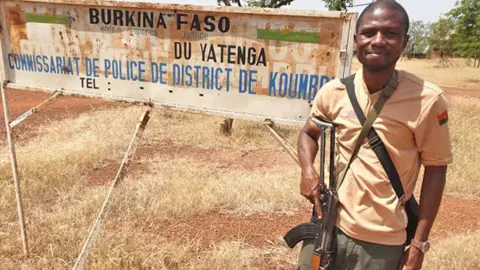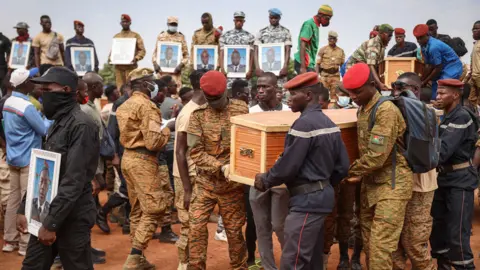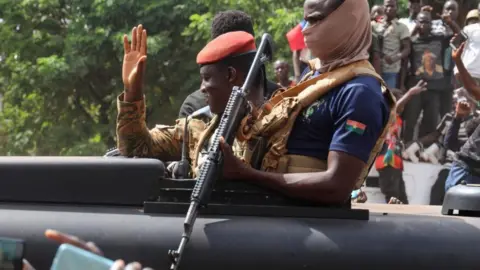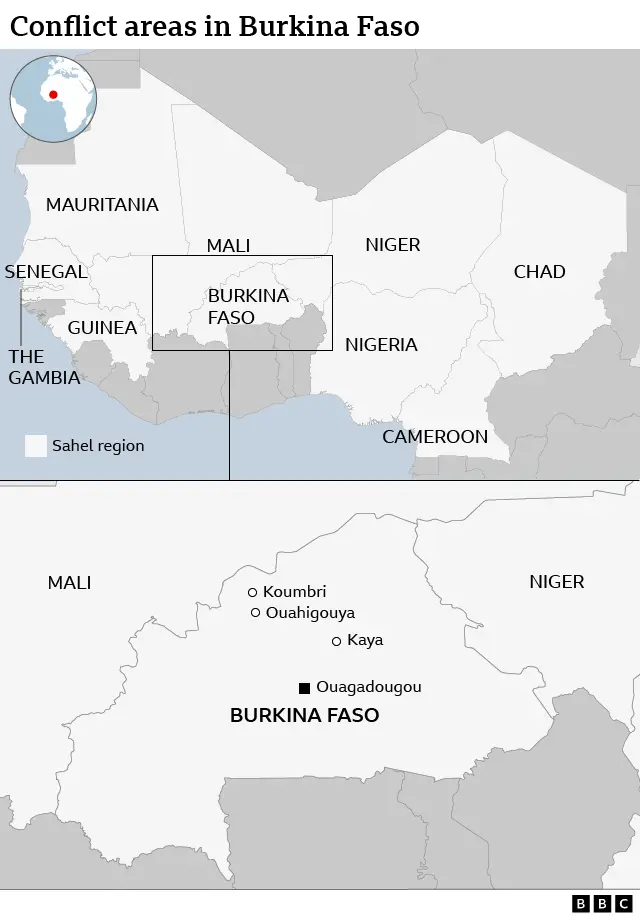Burkina Faso outcry over 'conscription used to punish junta critics'
 Arouna Louré
Arouna LouréIn what was widely seen as punishment for his strident criticism of Burkina Faso's military rulers, anaesthetist Arouna Louré was forced to go to the front lines of the battle against jihadists wreaking havoc in the West African state.
Dr Louré said he was with patients in the operating theatre at the hospital where he worked in the capital, Ouagadougou, when armed soldiers suddenly burst through the door.
"They made me understand they could make me leave using the gentle or the violent method," the 38-year-old told the BBC.
"Another doctor replaced me [in the theatre] and then we left," Dr Louré added.
He was bundled into a van by the soldiers and transported to a military training camp hundreds of miles away.
He is one of many men who have been forced to join the so-called Volunteers for the Defence of the Homeland (VDP).
Envisaged to be made up of 50,000 recruits, it was set up by Captain Ibrahim Traore's junta to bolster the army's efforts to regain territory from jihadists who, according to the US Department of Defense's Africa Center for Strategic Studies, have "moved to encircle Ouagadougou leaving a trail of unprecedented violence in their wake".
This is despite the fact that when Capt Traoré seized power in September 2022 after overthrowing another military ruler, he pledged to improve the security situation within "two to three months" and restore civilian rule by July 2024.
But Capt Traoré - who is the youngest ruler of an African state - has rowed back on his promise, saying elections are not "a priority" until territory is recaptured from the jihadists so that everyone can vote.
"There won't be an election that is only concentrated in Ouagadougou and Bobo-Dioulasso and other nearby towns," he said in November, referring to two cities that have largely been spared the violence unleashed by jihadists.
Capt Traoré has defended conscription, saying that "individual freedoms [are] not superior to national freedom" and added that "a nation is not built on indiscipline and disorder".
He has pivoted Burkina Faso towards Russia, ending its close ties with former colonial power France.
The junta has expelled French diplomats and has shut France's military base in the country.
At the same time, Russia has reopened its embassy in Burkina Faso after it was shut more than 30 years ago, and is also helping its army to strengthen its capabilities.
Last week, Capt Traoré said that Russian troops would join the fight against the jihadists, if required, with unconfirmed reports suggesting that about 100 Russian troops had already arrived in the country.

Dr Louré's recruitment into the VDP came last September, about five months after the junta passed a decree, giving it sweeping powers to conscript anyone above the age of 18 to fight the jihadists.
The anaesthetist believes he was targeted because he was a vocal critic of the military rulers on social media, describing them as "constitutional deserters" as they left the front lines and were sending civilians instead.
"In this country, we are no longer free to say what we think," he told the BBC.
Dr Louré's concerns were echoed by campaign group Human Rights Watch (HRW), which said in a report in November that the junta was using it to "expand its crackdown on dissent".
"The Burkinabé authorities are waging a legitimate war but responding to abuse with abuse is not the solution," senior HRW researcher Ilaria Allegrozzi said.
The junta's spokesperson and the minister of justice did not respond to BBC requests for comment.
HRW and other rights groups say that Dr Louré's case is not isolated - at least a dozen activists, journalists and opposition leaders have been conscripted.
They include pharmacist Daouda Diallo, who formed a rights group in 2019 to document abuses by all sides in the conflict in Burkina Faso.
His family and lawyers believe he was abducted by security agents on 1 December as he left the passport office in Ouagadougou.
A few days later, an image shared on social media showed him in the back of an army truck wearing a military uniform.
Amnesty International has taken up his plight, calling for his "safe return to civilian life and to end the use of conscription as a tool to silence dissent".
Conscription has caused huge trauma for families. One woman said that her husband - an investigative journalist - fled the country, shortly before his call-up papers arrived.
"It's like we're not living any more," said the woman, who asked not to be identified for fear of reprisals.
She added that she still feared for the safety of her husband even though the entire family was now living elsewhere in the region.
Dr Louré said he received minimal combat training before being deployed to three areas - including Koumbri, one of the most dangerous hot spots in the country's North region.
At least 17 soldiers and 36 army volunteers were reportedly killed in a battle in Koumbri on 5 September, only two days before he received his call-up orders via an official letter from the army.
 AFP
AFPDr Louré told the BBC that fortunately he was not involved in any fighting during his 94-day deployment.
Instead, he treated soldiers who showed symptoms of illnesses such as malaria.
"My presence would have been more useful in a hospital than on the front line," he said.
"In reality, I became a liability. I could have held my weapon incorrectly or fatally shot a civilian or a soldier," he added.
A civil society group challenged the conscription of some of its members in court after they received call-up papers shortly after announcing plans to hold a demonstration against the restriction of freedoms.
One of their lawyers, Guy Hervé Kam, said the court ruled that their conscription was illegal.
"We were able to demonstrate that this deployment was unnecessary and served as a punishment," Mr Kam told me in mid-January.
 Reuters
ReutersHowever, the junta has appealed against the ruling and Mr Kam himself was arrested one night late in January. He remains in custody and the reason for his detention is still not known.
Dr Louré, who is back home with his family, said he did not see a way out for anyone who received a call-up.
"The goal is to humiliate. If you obey, they take a photo of you and post it on social media to humiliate you. If you flee the country, they'll call you a coward. And if you sue the state, people will say that you are a coward too," he added.
Despite his experience, Dr Louré remains active on social media and is optimistic about Burkina Faso's future.
"What we deplore is the overall strategy of the government, corruption, illicit enrichment and nepotism. That doesn't happen at the front, but rather in Ouagadougou.
"This crisis is an opportunity for us to understand the cost of our disagreements and I am sure that we will be able to bounce back as a country," he said.


